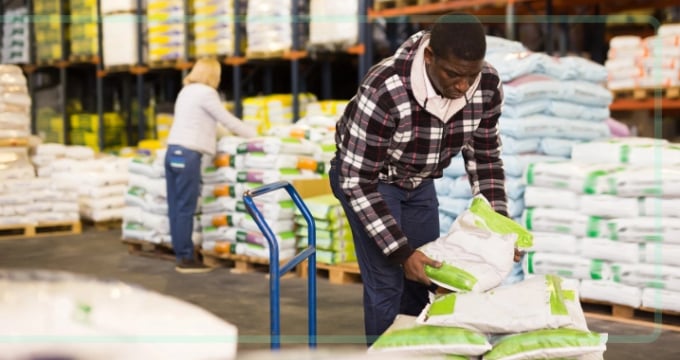November 27, 2025 | 10:32 GMT +7
November 27, 2025 | 10:32 GMT +7
Hotline: 0913.378.918
November 27, 2025 | 10:32 GMT +7
Hotline: 0913.378.918

Natural gas prices are at historic highs, and natural gas accounts for up to 90% of the operating cost of producing fertilizer. Photo: JackF via Getty Images
Fertilizer prices last week were nearly 10% higher than the week before according to Green Markets North America Fertilizer Price Index, the highest price point ever recorded. Prices are now 40% higher than a month ago, before the invasion of Ukraine.
The surge in fertilizer prices reveals how dependent many of the world's farms are on Russian exports. Countries already afflicted by food insecurity now risk further production bottlenecks and food shortages at the worst possible time.
Russian fertilizers are everywhere
The farming industry has been hit hard by the war and the political reaction in Russia to Western sanctions. Russia was the world’s top exporter of fertilizers in 2019, according to data from the Observatory of Economic Complexity, when Russia’s trade volume in fertilizer stood at nearly $9 billion.
Russia and neighboring Belarus, which has also been hit by sanctions, are key exporters of several critical fertilizing compounds, including urea and potash, but curtailed exports of these products has caused prices to soar. Surging fertilizer prices have also been aggravated by higher costs for natural gas, a critical feedstock in producing nitrogen-based fertilizer, amid a U.S. ban of Russian oil imports and discussions in Europe to decouple from Russian energy.
International shipping companies have largely suspended their activities in Russia, bringing global trade to a standstill. And in early March, Russian officials told fertilizer producers in the country to slow their exports in retaliation to Western sanctions.
The soaring costs of fertilizers, and other key agricultural commodities like wheat used for cow feed, could have knock-on effects throughout the world. The high prices might lead to severe bottlenecks, severely reducing agricultural production and aggravating what economists have already designated as a global food crisis.
A global food supply crisis
Before the invasion of Ukraine, the UN’s Food and Agriculture Organization had already warned that “acute food insecurity” was plaguing dozens of countries spanning Latin America, central Africa, the Middle East, and central Asia due to conflict and erratic environmental conditions. The economic fallout of the Ukraine War could further add to this insecurity.
“Ukraine has only compounded a catastrophe on top of a catastrophe,” David M. Beasley, executive director of the UN World Food Program, recently told The New York Times, adding that the current levels of food insecurity have not been seen since World War II.
The effects of trapped food products in Ukraine and Russia, both of which are global bread baskets, are already being felt in the world's more vulnerable countries. Around 40% of Ukraine's wheat and corn exports are intended for the Middle East and Africa, according to the UN International Fund for Agricultural Development (IFAD), which has expressed concern over how massive price swings for staple crops could affect stability in the region.
“I am deeply concerned that the violent conflict in Ukraine, already a catastrophe for those directly involved, will also be a tragedy for the world’s poorest people living in rural areas who cannot absorb the price hikes of staple foods and farming inputs that will result from disruptions to global trade,” said Gilbert F. Houngbo, President of IFAD.
“We are already seeing price hikes and this could cause an escalation of hunger and poverty with dire implications for global stability," Houngbo said.
Brazil, the world’s largest importer of fertilizers, was already expecting low crop yields this year due to an ongoing drought, and is now scrambling to increase domestic production of fertilizing products as it looks to plug the gap left by Russia.
Larger producers may be able to weather the storm of higher fertilizer prices, but smallholder and family-run farms who cannot afford higher costs can be hit hard by market volatility of these key products, Svein Tore Holsether, the CEO and president of Norwegian fertilizer giant Yara International, told Fortune at last November’s COP26 climate conference.
Natural gas prices were spiking last fall as demand roared back despite low inventory, causing a surge of fertilizer prices.
"I’m afraid we’re going to have a food crisis," Holsether said at the time.
(finance)

(VAN) A new study reveals how the simultaneous effects of ocean acidification, salinity and loss of oxygen are making the world more fragile.

(VAN) Hopes are growing that the creation of the first 3D turkey gut model could be a turning point in the battle against the virulent blackhead disease.

(VAN) Tyson, America’s biggest meat supplier, plans to shutter one of its largest beef processing plants as the industry continues to struggle with low cattle supplies and political pressure from Washington.

(VAN) New FAO study shows how digital solutions are empowering farmers and fishers to prevent losses and build resilient agrifood systems.

(VAN) Brazil's COP30 presidency pushed through a compromise climate deal on Saturday that would boost finance for poor nations coping with global warming but that omitted any mention of the fossil fuels driving it.

(VAN) Poultry farmers in the UK have been warned that they could face one of the worst winters yet for bird flu.

(VAN) Prices of main-crop paddy have risen sharply, with jasmine rice hitting 16,100 baht per tonne — the highest level in years.